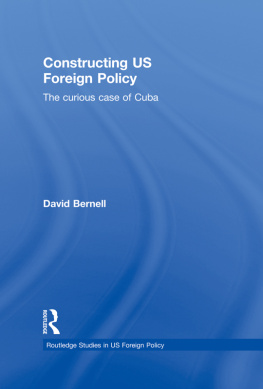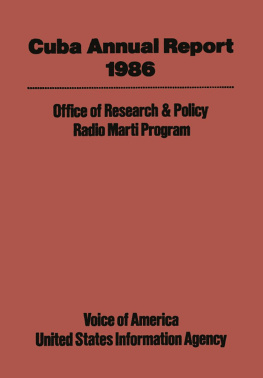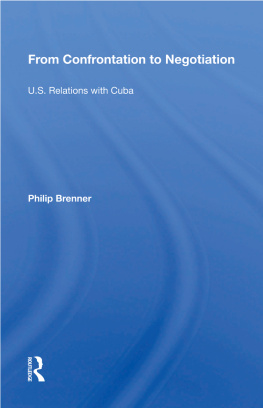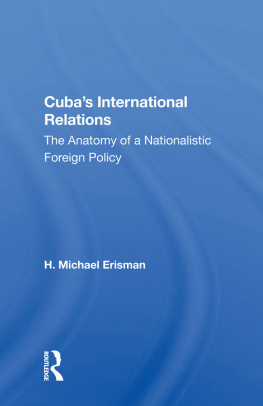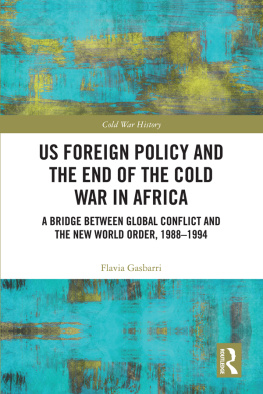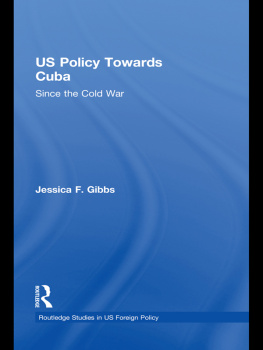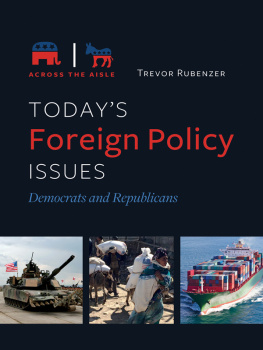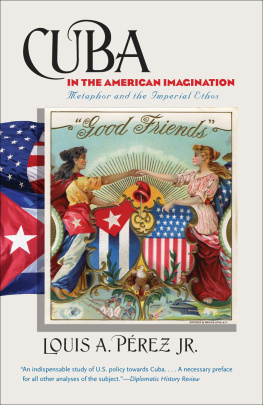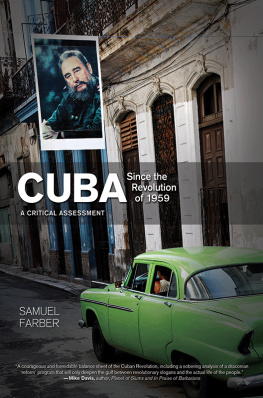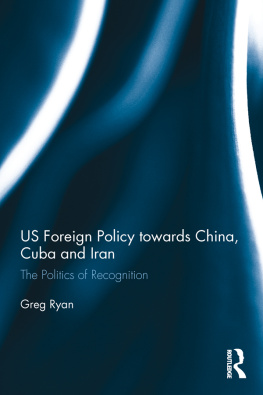Constructing US Foreign Policy
This book seeks to address the roots of the hostility that has characterized the United States relationship with Cuba and has persisted for decades, long after the Cold War. It answers the question of why Americas Cold War era policy toward Cuba has not substantially changed, despite a radically changed international environment, going beyond the common explanation that American electoral politics and the Cuban lobby drive US policy toward Cuba.
Bernell argues that US foreign policy towards Cuba cannot be viewed as an objective response to a set of challenges to US interests and principles, and is better understood as a policy that is rooted in and informed by historical understandings of American and Cuban identities, which are themselves historically contingent. Examining a wide range of sources including government documentation and official speeches, this work explores the origins and perpetuation of a policy perspective that emphasizes Cuban difference, illegitimacy, and inferiority juxtaposed against American virtue, legitimacy, and superiority.
This work will be of great interest to all scholars of US foreign policy, International Relations, and Latin American politics.
David Bernell is Assistant Professor of Political Science at Oregon State University, where he teaches and conducts research in international relations, United States foreign policy, and international political economy. He is the author of Readings in American Foreign Policy: Historical and Contemporary Problems (2008), and also consults for the renewable energy firm, Think Energy, Inc.
Routledge Studies in US Foreign Policy
Edited by
Inderjeet Parmar,
University of Manchester
and John Dumbrell,
University of Durham
This new series sets out to publish high quality works by leading and emerging scholars critically engaging with United States Foreign Policy. The series welcomes a variety of approaches to the subject and draws on scholarship from international relations, security studies, international political economy, foreign policy analysis and contemporary international history.
Subjects covered include the role of administrations and institutions, the media, think tanks, ideologues and intellectuals, elites, transnational corporations, public opinion, and pressure groups in shaping foreign policy, US relations with individual nations, with global regions and global institutions and Americas evolving strategic and military policies.
The series aims to provide a range of books from individual research monographs and edited collections to textbooks and supplemental reading for scholars, researchers, policy analysts, and students.
United States Foreign Policy and National Identity in the 21st Century
Edited by Kenneth Christie
New Directions in US Foreign Policy
Edited by Inderjeet Parmar, Linda B. Miller and Mark Ledwidge
Americas Special Relationships
Foreign and domestic aspects of the politics of alliance
Edited by John Dumbrell and Axel R Schfer
US Foreign Policy in Context
National ideology from the founders to the Bush Doctrine
Adam Quinn
The United States and NATO since 9/11
The transatlantic alliance renewed
Ellen Hallams
Soft Power and US Foreign Policy
Theoretical, historical and contemporary perspectives
Edited by Inderjeet Parmar and Michael Cox
The US Public and American Foreign Policy
Edited by Andrew Johnstone and Helen Laville
American Foreign Policy and Postwar Reconstruction
Comparing Japan and Iraq
Jeff Bridoux
Neoconservatism and American Foreign Policy
A critical analysis
Danny Cooper
US Policy Towards Cuba
Since the Cold War
Jessica F. Gibbs
Constructing US Foreign Policy
The curious case of Cuba
David Bernell
First published 2011
by Routledge
2 Park Square, Milton Park, Abingdon, Oxon OX14 4RN
Simultaneously published in the USA and Canada
by Routledge
711 Third Avenue, New York, NY 10017
Routledge is an imprint of the Taylor & Francis Group, an informa business.
2011 David Bernell
The right of David Bernell to be identified as author of this work has been asserted by him in accordance with sections 77 and 78 of the Copyright, Designs and Patents Act 1988.
All rights reserved. No part of this book may be reprinted or reproduced or utilised in any form or by any electronic, mechanical, or other means, now known or hereafter invented, including photocopying and recording, or in any information storage or retrieval system, without permission in writing from the publishers.
British Library Cataloguing in Publication Data
A catalogue record for this book is available from the British Library
Library of Congress Cataloging in Publication Data
Bernell, David.
Constructing US foreign policy: the curious case of Cuba / David Bernell.
p. cm. (Routledge studies in US foreign policy)
Includes bibliographical references and index.
1. United StatesForeign relationsCuba. 2. CubaForeign relationsUnited States. I. Title.
E183.8.C9B46 2011
327.7307291dc22 2010037876
ISBN: 978-0-415-78067-4 (hbk)
ISBN: 978-0-203-82926-4 (ebk)
Preface
Pizza, all I wanted. That was always the first thought that came to my mind when I got to skip school and go to work for the day with my grandpa. Going to work with him was extra special because it meant taking a trip, a trip to some wonderful, far off place (about an hour or two by car) where we would complete the day in the best of all possible ways: by going for pizza.
Grandpa sold TV tubes, these days just one more ancient relic in the long line of obsolete technologies our society has used up and thrown away, but in the olden days (for me, at least), the 1970s, TV tubes were still good business. So my sister and I would get to play hooky and go spend the day with gramps on the road from Albuquerque, the place we called home, to Santa Fe, Los Alamos, or our favorite, Grants. Strangely enough, it was not Santa Fe, the exciting, popular city different, or Los Alamos, the mysterious, hidden city, high in the mountains where Robert Oppenheimer, Richard Feynman and other scientific legends gathered decades ago to build the atomic bomb, but Grants, a small, dying mining town in western New Mexico, that rewarded us with our strongest memories of being with our grandfather. Perhaps it was precisely because the city was such a nondescript place, so devoid of glamour and history, that we were all better able to revel in the company. Perhaps, but to try to explain why those trips were so much fun is to tamper with the magic.
As we rode along the dusty highway (sometimes he let us drive even though we were far too young to do this legally) we could see for distances that seemed to stretch forever. The terrain was so flat, as if someone had taken a straightedge and run it along the ground. Only Mt. Taylor, jutting up in the distance, interrupted the perfection of the flattened horizon. Yet my sister and I really werent aware of the significance of the land, of the ancient Indian ruins that we drove past, of the magnificent treeless landscape, the miles and miles of beautiful emptiness. The two of us had something better: we had grandpa. It was a special occasion indeed.

